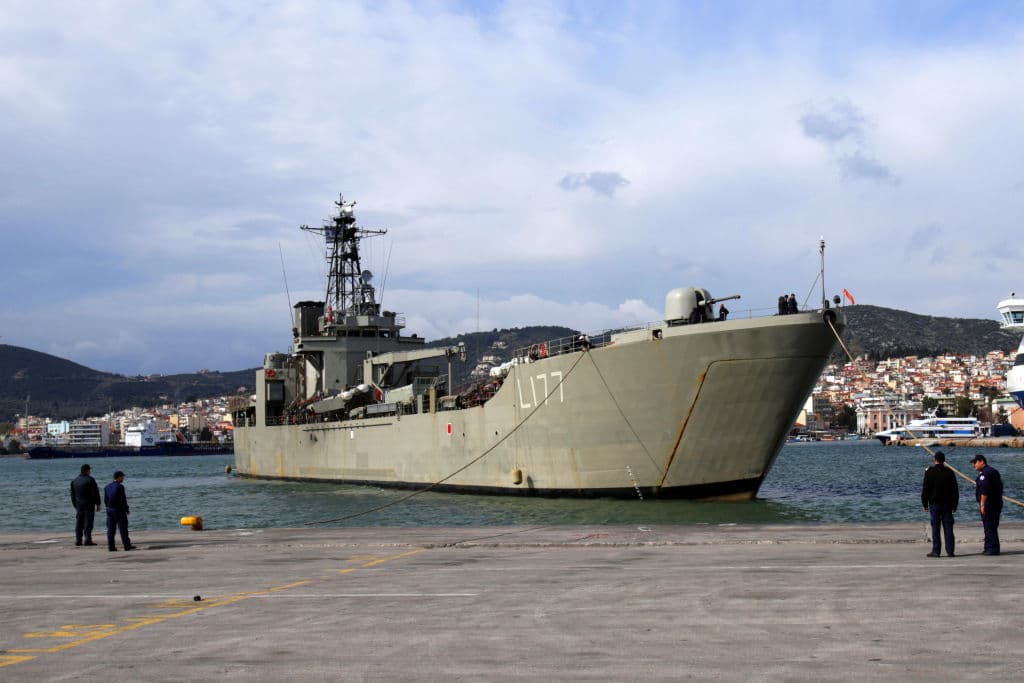Biden Administration Takes a Plunge in Mediterranean With Greece, but Turkey Will Feel the Splash
Plans to build American bases on two Greeks islands in Aegean could complicate relations with Ankara.

In another sign of how the war in Ukraine is shaking up the geopolitical scene, Washington is actively seeking along with Greece to amplify its strategic reach in the Aegean Sea — a move almost certain, in time, to vex Turkey. Notwithstanding that Greece and Turkey are neighbors and that both are party to the North Atlantic Treaty, and despite a recent thaw in generally fraught relations, the two countries are at odds over a range of issues.
These include delimitation of territorial waters and exclusive economic zones, use of the continental shelf, and — for Turkey especially — the issue of the demilitarized status of certain Greek islands in the Aegean Sea.
The latter issue is, along with the ongoing Cyprus problem, a potential flashpoint between Athens and Ankara. The Russian invasion of Ukraine has had the knock-on effect of pushing to the fore long-festering issues in the deceptively calm Aegean Sea.
The reason for that, in short, is because now more than ever the Aegean is seen as a bulwark against the extension of malign Russian naval activity in the Black Sea to points south — and, of course, the maritime “road” to the Mediterranean from Ukraine runs through the Dardanelles Strait, which is controlled by Turkey.
Earlier this month Congresswoman Grace Meng, a member of the Congressional Hellenic Caucus and the House Appropriations Committee, introduced an amendment to a spending bill, the National Defense Authorization Act, that focuses on shoring up the Greek-American security relationship, namely by calling for an expanded American military presence in Greek territory with an emphasis on Greek islands.
The annual authorization bill for the Department of Defense requires the secretaries of defense and state to jointly submit a report to the appropriate congressional committees. It has already passed in the House.
As for Ms. Meng’s amendment, it comes in the context of the expanded defense cooperation agreement Washington and Athens signed in October 2021 that grants American forces access to four additional military bases in Greece.
The islands in the spotlight for an expanded military role are Skyros, situated in the middle of the Aegean Sea, and Lemnos, in its more northern reaches.
Since the Russian invasion of Ukraine, the northern Greek port city of Alexandroupoli has emerged as a key logistics hub for sending military equipment to NATO member states north of Greece, notably Poland, and from there onward to Ukraine.
Having bases on the two Aegean islands would in effect unite Alexandroupoli with the large Greek and NATO naval base at Souda Bay on the island of Crete farther south, thereby consolidating Western security interests on NATO’s broad southeastern flank straight down to the Suez Canal.
The Pentagon’s increased military activities in Greece are a response chiefly to the war in Ukraine but also to Russian naval operations that preceded it and are ostensibly ongoing. While the islands of Skyros and Lemnos are obscure to many Americans, they are familiar terrain to Greeks who generally welcome the prospect of deeper American engagement there.
One reason for that support is that a more prominent American presence would shield existing Greek military installations there from potential Turkish threats, and act as a stopgap on illegal Turkish air force overflights of Greek territory in the Aegean.
The American footprint might have been deeper at this critical point in time but, according to some Greek press reports, objections were expressed in the past by President Obama’s former ambassador to Greece, Geoffrey Pyatt (who was also previously an ambassador to Ukraine). It is not clear what those objections were.
Building the bases would be a boost to security in the eastern Mediterranean with respect to the Russian threat, but it also risks alienating Turkey because of its longstanding issues with Greece.
After the passage of the defense spending bill amendment, it did not take long for Turkish media to report that Ankara would be following developments closely and for Greek media to report how Turkish naval bases could pose fresh threats to both Greece and Cyprus.
Some of those threats are overstated, others less so. Turkey’s naval bases at Foça, Izmir, Marmaris, İskenderun, and Mersin could be used in the future to create marine bridgeheads in the Aegean and eastern Mediterranean. The tip of Turkish-occupied northern Cyprus lies due south of Mersin, and Turkey is reportedly building a new naval base there.
Turkey does not necessarily have to wield force to make its power known. Consider that the EastMed pipeline, a project originally backed by Greece, Cyprus, and Israel, would have run through Cyprus and Crete to mainland Greece. But last year Washington withdrew its support. That the pipeline will now bypass Cyprus is seen with no particular glee in Greece as a quiet win for Turkey.
Long-term Turkish maritime strategy often highlights the 25th meridian, which bisects the Aegean Sea. In President Erdogan’s revanchist view, the sea and islands between the Turkish coast and that invisible line should not all necessarily bear the mantle of Hellenic sovereignty. Skyros, the Greek island where one American base is likely to go, is comfortably west of the meridian. But Lemnos, where there will likely be another, is just east of it.

